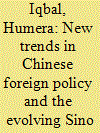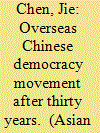| Srl | Item |
| 1 |
ID:
179804


|
|
|
|
|
| Summary/Abstract |
Arabian Peninsula politics are in a period of enormous transformation. In the context of a new generation of rulers seeking legitimacy through ambitious foreign policy regimes, shifting relations with Iran, the 2017–2021 Qatar crisis, and ongoing conflict in Yemen, this article introduces the July 2021 special section of International Affairs, which examines how the Arab states of the Gulf are adapting to these new realities. Questions addressed include: how have transnational identities been manipulated by states during regional disputes? How have oil and gas revenues been redirected to build up religious soft power and enhance state branding efforts? In an increasingly authoritarian world, how has transnational repression interacted with politicized diasporas to impact opposition mobilization? And, how do disputes over airspace help us understand the process of sovereignty-building in the modern Middle East? In pursuing these questions, the special section challenges the particularism still apparent in many analyses of the Gulf region, and seeks to bridge International Relations with fieldwork-based Gulf studies. The research presented in the section highlights new findings within contemporary research on the Gulf that will be of interest both to policy-makers and others seeking to understand the long-term sustainability and balance of power in this critical region.
|
|
|
|
|
|
|
|
|
|
|
|
|
|
|
|
| 2 |
ID:
147086


|
|
|
| 3 |
ID:
142924


|
|
|
|
|
| Summary/Abstract |
A number of issues such as climate change, energy efficiency, renewable energy and energy prices have dominated debates on energy. Students from the Energy and Environment Concentration of the School of International and Public Affairs of Columbia University had summer internships in various sectors of the energy industry. They shared their observations on emerging trends in the energy industry with the Journal.
|
|
|
|
|
|
|
|
|
|
|
|
|
|
|
|
| 4 |
ID:
131653


|
|
|
|
|
| Publication |
2014.
|
| Summary/Abstract |
The overseas Chinese democracy movement, sustained by exiled Chinese dissidents in the West, has just reached its 30th anniversary. Despite a widely held view that it has declined and failed irrevocably from its moral and political height during the first half of the 1990s, new trends have emerged.
|
|
|
|
|
|
|
|
|
|
|
|
|
|
|
|
| 5 |
ID:
179805


|
|
|
|
|
| Summary/Abstract |
What does the recent Gulf diplomatic crisis of June 2017 to January 2021 mean for the future of the region's signature transnationalism: the khalījī [Gulf] identity? This identity narrative encompasses the shared sociocultural backgrounds of the people of the region, but the unprecedented separations, caused by the regional crisis, may have shifted the discourse of belonging in the Gulf. To investigate the impact of the recent crisis on regional identity narratives, this article explores the new National Museum of Qatar's presentation of Qatar's political history from 1848 to 1868, as well as museum-goers' reactions to this presentation, through original fieldwork and ethnographic interviews with Qatari and expatriate residents. The analysis highlights the museum's purposeful portrayal of parallels between intra-Gulf conflicts of the past and the recent crisis, a presentational choice that stands in sharp contrast to previous regional norms of tactful diplomacy. Further, museum-goers recognized the linguistic and symbolic parallels, provoking both engagement with and rejection of the concept of khalījī identity. In summary, this analysis suggests that the crisis has shifted the norms of discourse in the region in ways that may make social reconciliation difficult, even as political bonds resume. As the region moves forward from crisis, policy-makers should reduce the tension between national and transnational identity narratives by creating space for the renewal of khalījī ties.
|
|
|
|
|
|
|
|
|
|
|
|
|
|
|
|